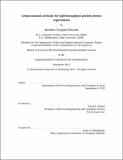Computational methods for high-throughput pooled genetic experiments
Author(s)
Edwards, Matthew Douglas
DownloadFull printable version (888.6Kb)
Other Contributors
Massachusetts Institute of Technology. Dept. of Electrical Engineering and Computer Science.
Advisor
David K. Gifford.
Terms of use
Metadata
Show full item recordAbstract
Advances in high-throughput DNA sequencing have created new avenues of attack for classical genetics problems. This thesis develops and applies principled methods for analyzing DNA sequencing data from multiple pools of individual genomes. Theoretical expectations under several genetic models are used to inform specific experimental designs and guide the allocation of experimental resources. A computational framework is developed for analyzing and accurately extracting informative data from DNA sequencing reads obtained from pools of individuals. A series of statistical tests are proposed in order to detect nonrandom associations in pooled data, including a novel approach based on hidden Markov models that optimally shares data across genomic locations. The methods are applied to new and existing datasets and improve on the resolution of published methods, frequently obtaining single-gene accuracy.
Description
Thesis (S.M.)--Massachusetts Institute of Technology, Dept. of Electrical Engineering and Computer Science, 2011. This electronic version was submitted by the student author. The certified thesis is available in the Institute Archives and Special Collections. Cataloged from student submitted PDF version of thesis. Includes bibliographical references (p. 61-65).
Date issued
2011Department
Massachusetts Institute of Technology. Department of Electrical Engineering and Computer SciencePublisher
Massachusetts Institute of Technology
Keywords
Electrical Engineering and Computer Science.